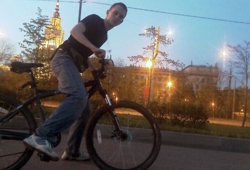
The New Yorker gives 18-year-old Chatroulette founder Andrey Ternovskiy the treatment in a lengthy profile. The article provides many colorful details and background on Ternovskiy’s upbringing in Moscow, the son of two mathematicians living on salaries of a few hundred dollars a month. It compares the random video chat site to Ternovskiy’s experiences working in an uncle’s souvenir shop encountering strange tourists all day long. It also portrays him as a juvenile delinquent of sorts:
Like many young Russians with programming skills, Ternovskiy turned to hacking. When he was eleven, he came upon zloy.org (which translates as angry.org), a hacker forum led by a young man named Sergey (a.k.a. Terminator), who trained his followers in cyber warfare. Using the handle Flashboy, Ternovskiy soon mastered the art of the denial-of-service attack, wherein a target system is paralyzed by a mass of incoming communication requests. Next came Web-site and e-mail hacking, a service he gladly performed for girls who asked nicely. By 2007, at the age of fifteen, Ternovskiy had learned about what hackers call “social engineering”—getting what one wants through deceit or manipulation. Posing as a teacher, Ternovskiy got access to some practice tests before they were delivered to his school.
Ah, the rogue hacker—who else would you expect to create such a seedy site filled with perverts? Yet it is the hacker’s curiosity which led Ternovskiy to create Chatroulette. And more than anything else, it becomes his ticket out of Russia—not because it is making much money, but because it captured a lot of attention. We learn that Union Square Ventures partner Fred Wilson speeded up his visa to visit the U.S. with a personal letter of recommendation, he almost missed his plane, and that Russian investor Yuri Milner made sure there was a car waiting for him when he landed in New York. (Incidentally, Wilson, Milner, and Ternovskiy will all be speaking at our Disrupt conference at the end of May).
New York City was too dreary. He kept on going to California (where he made the rounds, even stopping by the TechCrunch offices for an interview). He has no intention of ever returning to Moscow if he can help it. He already has an apartment in Palo Alto, and Shervin Pishevar of SGN is helping him apply for a longer-term visa. Maybe he just feels more at home in Silicon Valley with all the other digital delinquents.